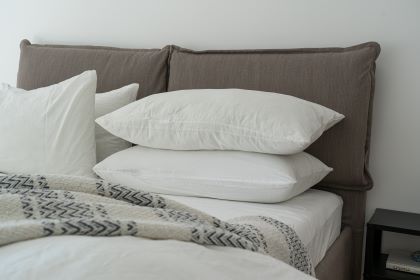What are The Pore-Clogging Culprits in Your Bedroom
- The accumulation of dead skin cells, oil, and bacteria on your bedding can transfer onto your face during sleep, clogging pores and leading to acne breakouts.
- Regularly washing and changing your pillowcases and bedding is crucial to minimize the risk of pore-clogging and bacterial growth.
Dirty Air and Dust:
- Dust particles and airborne pollutants can settle on various surfaces in your bedroom, including your sheets and pillowcases, exacerbating acne-prone skin.
- Regular dusting, vacuuming, and ensuring proper ventilation can help reduce the accumulation of dust and maintain a cleaner environment.
Improve Your Humidity and Moisture – Open Your Windows Daily
Dampness and Mold:
- High humidity levels in the bedroom can promote mold growth, which releases spores into the air and triggers acne flare-ups.
- Investing in a dehumidifier, ensuring proper ventilation, and promptly addressing any water leaks or dampness issues can help control humidity levels and prevent mold formation.
Moisturizers and Cosmetics:
- While essential for skincare, excessive or improper use of moisturizers and cosmetics can trap moisture in the skin, leading to clogged pores and acne.
- Opt for non-comedogenic, oil-free products specifically designed for acne-prone skin and ensure thorough removal before bedtime.
Improve Your Lighting and Sleep Hygiene
Blue Light Exposure:
- Electronic devices emit blue light that can disrupt your sleep patterns and increase sebum production, contributing to acne development.
- Limit screen time before bed, use blue light filters or glasses, and create a dark, soothing sleep environment to promote better sleep and healthier skin.
Stress and Sleep Deprivation:
- Chronic stress and lack of quality sleep can trigger hormonal imbalances, increasing the likelihood of acne breakouts.
- Establish a relaxing bedtime routine, practice stress-management techniques, and aim for 7-9 hours of uninterrupted sleep to support overall skin health.
Look For Any Potential Allergens and Irritants
Fabric Allergies:
- Allergens present in certain bedding materials, such as dust mites or synthetic fibers, can cause skin irritation and aggravate acne-prone skin.
- Opt for hypoallergenic bedding made from natural fibers like cotton or bamboo, and wash them regularly in hot water to eliminate allergens.
Harsh Laundry Products:
- Residual traces of laundry detergents and fabric softeners can irritate the skin and trigger acne breakouts.
- Switch to fragrance-free, hypoallergenic detergents and avoid using fabric softeners to minimize the risk of skin irritation.
Taking a closer look at your bedroom environment is vital in understanding the potential triggers behind your acne breakouts. From bedding and humidity to lighting and irritants, various factors can contribute to skin inflammation and clogged pores. By implementing simple yet effective changes, such as washing bedding regularly, managing humidity levels, using non-comedogenic products, and promoting good sleep hygiene, you can create a bedroom that supports clearer, healthier skin.
Remember, a clean and acne-friendly sleeping space can significantly contribute to your overall skincare routine and pave the way for a consistent complexion. Prioritize the cleanliness and maintenance of your bedroom to enhance your skincare efforts and reduce the frequency and severity of acne breakouts.
By addressing the pore-clogging culprits, such as regularly washing and changing your bedding and pillowcases, you can prevent the transfer of dirt, oil, and bacteria onto your face while you sleep. Regular dusting, vacuuming, and ensuring proper ventilation will minimize the accumulation of dust and airborne pollutants, reducing the risk of skin irritation and breakouts.
Humidity and moisture control are crucial factors in maintaining an acne-friendly bedroom environment. Investing in a dehumidifier and addressing any dampness or mold issues will help prevent the growth of acne-triggering mold spores. Additionally, using non-comedogenic, oil-free moisturizers and cosmetics and removing them thoroughly before bed can prevent pore-clogging and acne formation.

Considering the impact of lighting and sleep hygiene is equally important. Minimizing exposure to blue light from electronic devices before bed, using blue light filters or glasses, and creating a dark and soothing sleep environment will promote better sleep quality and reduce sebum production, ultimately supporting healthier skin. Managing stress levels and ensuring sufficient sleep duration are also crucial for hormonal balance, which in turn can help reduce acne flare-ups.
Allergens and irritants present in your bedroom can significantly impact acne-prone skin. Opting for hypoallergenic bedding made from natural fibers like cotton or bamboo, washing them regularly in hot water to eliminate allergens, and avoiding harsh laundry products can alleviate skin irritation and inflammation.
Your bedroom environment plays a significant role in the development and aggravation of acne breakouts. By addressing the various factors discussed in this article, you can create a clean, acne-friendly sleeping space that supports your skincare routine.
Maintaining clean bedding, managing humidity levels, using non-comedogenic products, practicing good sleep hygiene, and minimizing exposure to allergens and irritants will go a long way in promoting clearer, healthier skin.
Remember, consistency in maintaining an acne-friendly bedroom, combined with a comprehensive skincare regimen, will lead to a more confident and radiant complexion.
